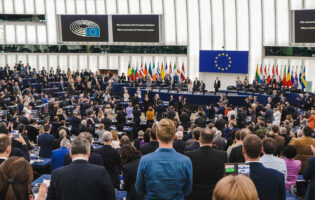Work Still Remains
At a recent luncheon event in Washington DC, I was reminded of how fragile the western economy is. A president of one of the 12 U.S. Federal Reserve Banks warned his audience that, “if the FED is the only game in town, we will end up with Weimar or Argentina.” And on Wednesday this week, the CEO of JP Morgan Chase, Jamie Dimon, warned that “bond markets will turn against the U.S. The question is not if but only when.” Also this week, the International Monetary Fund (IMF) issued a warning to both Europeans and Americans, and advised politicians on the old continent to resist both complacency on the one hand, and blind insistence on tight fiscal austerity in a weakening economic environment on the other.
Stock markets reacted promptly by retreating, as investors seemed to anticipate both a weaker earnings season and heightened volatility in the coming months.
This past week offered enough evidence to support both growing unease and cautious optimism. Let’s focus on the brighter side first.
The week started with a largely symbolic visit by the German Chancellor to Athens. Officially, no promises were made, but it is clear that Angela Merkel’s message to Greek Prime Minister Antonis Samaras is that Germany will support Greece if Athens undertakes some more decisive steps on the path of reform. In other words, Merkel needs to feed her skeptical electorate with some tangible, albeit limited, results in order to convince her voters that Greece needs to stay in the euro zone and receive either more money or more time to meet its fiscal targets.
Now to the less positive developments. Leading German economists, presenting their economic outlook in Berlin this week, disagreed with the Chancellor. They argued that Greece will not be able to recover without restructuring its debt, now largely held by the official sector. Of course, the German government will not allow this to happen a year before the general election. However, a shift in the debate in Germany from so-called Grexit scenarios to a more sober and realistic assessment of situation is a positive sign.
The leading economic institutes also issued a stark warning about the health of the German economy, now clearly suffering from the economic crisis in the periphery of the continent and in danger of slipping into recession if things deteriorate further. If Merkel takes their advice seriously, she will try to do what she can in order to avoid unsettling financial markets. Renewed uncertainties about Europe could push the German economy into a recession right in the middle of an election year. Merkel must realize that what the fragile European economy needs now is a period of relative calm, not a new existential crisis.
However, the week also offered a cautionary tale about the difficulties of overcoming the deeply seated diffidence within Europe. It was government discord that killed the merger between the two defense and aerospace giants EADS (European Aeronautic Defense and Space Co) and BAE Systems. According to several media reports, it was the Chancellor who informed the French President that there would be no deal. She did not feel that German interests were sufficiently protected by the merger. Despite all the talk of more European integration, national interests trumped the need to forge a strong European company. To be sure, other obstacles played a role as well. But the collapse of the negotiations was a stark reminder of how big the gap can be between the high-flying rhetoric advocating a closer Europe and the parochial realities on the ground. The continent’s politicians still haven’t decided whether they are merely moving towards closer coordination or if they are on a path towards closer integration, whether the goal is a diffident or rather a more decisive Europe.
Politicians on both sides of the Atlantic have yet to prove that they are really willing to do what is needed to put the West back on track. The next few months will provide enough opportunities for them to put their money were their mouth is.









